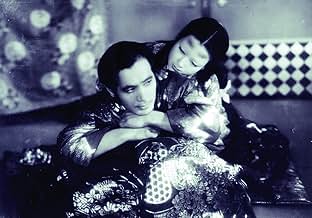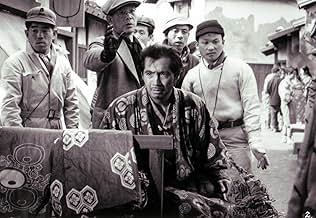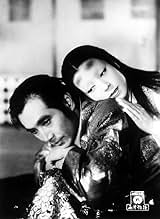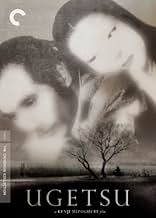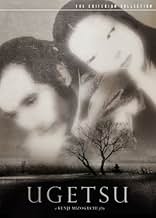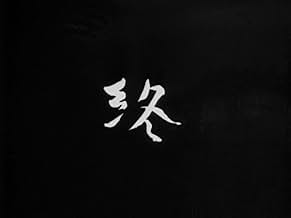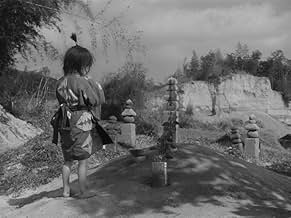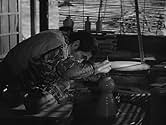CALIFICACIÓN DE IMDb
8.1/10
27 k
TU CALIFICACIÓN
Ambición, familia, amor y guerra ambientada en medio de las guerras civiles japonesas del siglo XVI.Ambición, familia, amor y guerra ambientada en medio de las guerras civiles japonesas del siglo XVI.Ambición, familia, amor y guerra ambientada en medio de las guerras civiles japonesas del siglo XVI.
- Nominado a 1 premio Óscar
- 6 premios ganados y 2 nominaciones en total
Eitarô Ozawa
- Tôbei
- (as Sakae Ozawa)
Argumento
¿Sabías que…?
- TriviaThe plot is a combination of two tales from the work of Ueda Akinari called "Tales of moon and rain".
- ErroresAfter the soldier cuts off the general's head there's no blood on his sword.
- ConexionesFeatured in De l'origine du XXIe siècle (2000)
Opinión destacada
Ugetsu is a film that separates itself from both period pieces of its time and from Japanese film of any era. It neither has the ferocious, exiting energy that Kurosawa successfully utilized, nor the slow mundane nature that Ozu became known for. Rather it attempts (successfully) to give a drawn out, slightly surrealistic atmosphere that exhibits images of lingering beauty throughout its short length. What drew me into the film deepest was the usage of not style or substance (if that makes sense), but rather these images that remained on your mind long after the film was finished. A sabotaged boat drifting away in the fog with nothing but a dead man aboard, an enchantress' seduction of a naive peasant and a landscape dotted with danger and war, all make up some of the most beautiful images, that would not be out of place in a painting. They alone say more then most films do in their entire message.
The film nonetheless has some very impressive subject matter to its credit, dealing with war, greed and the line between reality and the spiritual world. Throughout the film we see two peasants progressively grow to lust for the riches of the world, Genjurô desires to sell his wares and become wealthy, while Tobei desires to be a samurai and have power. In time they both get to a point where this is a reality, where one of them fulfills what he desires, the other is led into a surrealistic haze by a demonic seductress. In the end the loss of what was important all along becomes apparent, and a message of humility becomes the films point.
Though it is not nearly as accessible a film as Kurosawa's period pieces of the same time, Ugetsu succeeds on a level that they do not. It brings an element of sheer beauty I have not been acquainted with by any Japanese director. The camera moves much slower as to give you a sense of your surroundings, to allow the film to become part of you. In doing this Mizoguchi distances some viewers, while at the same time bringing many to a level impossible with any other director (Eastern or Western). He successfully does what all great artists do, he makes his art truly great and therefore truly subjective.
There is not a lot I can further say about this beautiful film except that it is best taken on an image by image base with the real plot as a second consideration. When one has experienced the images the plot becomes more meaningful, and the result is one of the most beautiful films one will ever witness. I gave Kenji Mizoguchi's crowning achievement a deserving 9/10. Ugetsu is a beautiful flawless example of the cinema that I sincerely recommend.
The film nonetheless has some very impressive subject matter to its credit, dealing with war, greed and the line between reality and the spiritual world. Throughout the film we see two peasants progressively grow to lust for the riches of the world, Genjurô desires to sell his wares and become wealthy, while Tobei desires to be a samurai and have power. In time they both get to a point where this is a reality, where one of them fulfills what he desires, the other is led into a surrealistic haze by a demonic seductress. In the end the loss of what was important all along becomes apparent, and a message of humility becomes the films point.
Though it is not nearly as accessible a film as Kurosawa's period pieces of the same time, Ugetsu succeeds on a level that they do not. It brings an element of sheer beauty I have not been acquainted with by any Japanese director. The camera moves much slower as to give you a sense of your surroundings, to allow the film to become part of you. In doing this Mizoguchi distances some viewers, while at the same time bringing many to a level impossible with any other director (Eastern or Western). He successfully does what all great artists do, he makes his art truly great and therefore truly subjective.
There is not a lot I can further say about this beautiful film except that it is best taken on an image by image base with the real plot as a second consideration. When one has experienced the images the plot becomes more meaningful, and the result is one of the most beautiful films one will ever witness. I gave Kenji Mizoguchi's crowning achievement a deserving 9/10. Ugetsu is a beautiful flawless example of the cinema that I sincerely recommend.
- Trouter2000
- 14 ago 2007
- Enlace permanente
Selecciones populares
Inicia sesión para calificar y agrega a la lista de videos para obtener recomendaciones personalizadas
- How long is Ugetsu?Con tecnología de Alexa
Detalles
Taquilla
- Total en EE. UU. y Canadá
- USD 11,197
- Fin de semana de estreno en EE. UU. y Canadá
- USD 6,154
- 5 mar 2017
- Total a nivel mundial
- USD 24,959
- Tiempo de ejecución1 hora 36 minutos
- Color
- Relación de aspecto
- 1.37 : 1
Contribuir a esta página
Sugiere una edición o agrega el contenido que falta

Principales brechas de datos
By what name was Ugetsu (1953) officially released in India in English?
Responda

